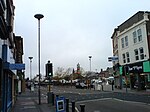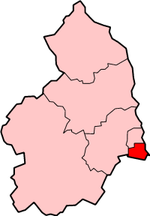Blyth railway station
1847 establishments in EnglandBeeching closures in EnglandBlyth, NorthumberlandDisused railway stations in NorthumberlandFormer North Eastern Railway (UK) stations ... and 6 more
Pages with no open date in Infobox stationRailway stations in Great Britain closed in 1867Railway stations in Great Britain closed in 1964Railway stations in Great Britain opened in 1847Railway stations in Great Britain opened in 1867Use British English from December 2016

Blyth railway station served Blyth, Northumberland on the Blyth Branch line in Northeast England.
Excerpt from the Wikipedia article Blyth railway station (License: CC BY-SA 3.0, Authors, Images).Blyth railway station
Regent Street,
Geographical coordinates (GPS) Address Website Nearby Places Show on map
Geographical coordinates (GPS)
| Latitude | Longitude |
|---|---|
| N 55.128 ° | E -1.513 ° |
Address
Morrisons Blyth
Regent Street
NE24 1LQ , Waterloo
England, United Kingdom
Open on Google Maps





